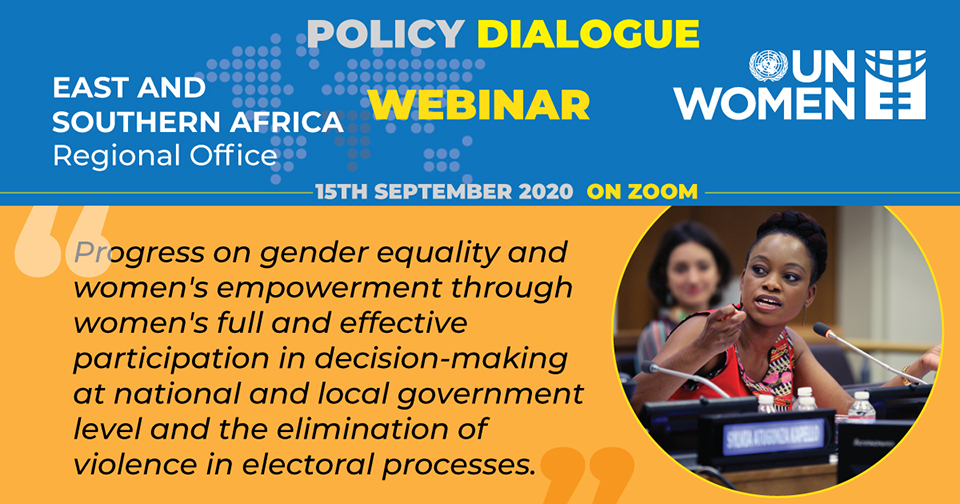UN Women to hold a policy dialogue to assess progress on gender equality and women's empowerment
Date:

UN Women is conducting a 2-day virtual Policy Dialogue on Gender Equality and Women's Empowerment through Women's Full and Effective Participation in Decision-Making at National and Local Government Levels and the Elimination of Violence in Electoral Processes.
The Policy Dialogue will look at progress made over the 25-year period, and highlight the good practices and lessons learned over the last 15 years. It will discuss key strategies that have accelerated women’s increased representation in elective office including temporary special measures, constitutional and other legal and policy instruments that advance gender equality and women’s empowerment; the impact of women’s representation and leadership including accountability for gender equality and women’s empowerment frameworks and policies; and how political institutions, women’s associations and human rights organizations have facilitated progress on the agenda.
The overall goal of the Policy Dialogue is to appraise progress in ESAR in the 7th Area of Concern of the Beijing Platform for Action, i.e. Women in Power and Decision making. It strives to review measures taken and their impact to ensure women’s equal access to and full participation in decision-making and appraise measures taken to increase women’s capacity to participate in power structures and decision-making.
2020 marks the 25th anniversary of the Fourth United Nations World Conference on Women in Beijing, which represented a turning point for the global agenda for gender equality and resulted in pivotal commitments and objectives, the results of which we still measure today. The Beijing Declaration and the Platform for Action, by 189 countries at the Conference in 1995, is the most comprehensive global policy framework for the rights of women. It recognizes women’s rights as human rights and sets out a roadmap for achieving equality between women and men, with concrete measures and measurable outcomes across a range of issues affecting women and girls. The Beijing Platform for Action has women in power and decision making as one of the twelve critical Areas of Action. It calls for “robust laws and policies” to push the agenda.
There has been significant progress in women’s representation in decision-making making positions in the East and Southern Africa Region (ESAR) between 2005 and December 2019. At the national level, 32% of representatives in national parliaments are women, with Rwanda topping the world with 61% female representation. Four countries have achieved gender parity (i.e. at least 40% women’s representation), 9 countries have more than 30% women’s representation, 8 countries more than 20% and 3 countries have less than 20% women’s representation. For local government representation, the average representation of women in the ESA region is 29.1%, with Uganda having the highest representation of females of 45.7% followed by Namibia with 45.1%. Five countries achieved gender parity in the region in women’s representation in local government, Uganda (45.7%), Namibia (45.1%), South Africa (40.7%), Rwanda (40%) and Lesotho (40%). The ESAR region from the statistics stands a good chance of achieving gender parity in representative office by 2030.
The impact of COVID-19 on women has shown that many of the gains in women’s empowerment is superficial” said DG of UNON, ASG Haja Zainab Hawa Bangura. There is an increase in SGBV, women who are the majority in the informal sector are losing jobs with little social protection, unpaid care work has increased as even women who work in the formal sector have to take on added responsibility of full time care and house work in addition to working from home. The woman is still highly vulnerable and has limited protection from rules /laws and policies that have been set and being interpreted by men. It is not just about numbers, continued ASG Bangura, but there is need for “a qualitative shift that will bring about social justice”. Women need to be at the table of decision making and look at the details.
According to UN Women Executive Director, Dr Phumzile Mlambo-Ngcuka, “women still face the same challenges they did in 1995 and before to enter politics; structural barriers, fewer financial resources, harmful norms, and lack of political will to translate policies into action”.
The goal of the Dialogue is to highlight progress, impact, good practices, lessons learned and recommendations for addressing the gaps in progress. The emphasis will be on identifying the mechanisms that increase women’s participation, representation and effective leadership in decision making, and the factors that hinder their participation.
Over 80 participants from East and Southern Africa, including experts and practitioners from academia, government, political parties, women’s organizations, UN Agencies, development partners, representatives from African Women Leaders Networks are attending the meeting.